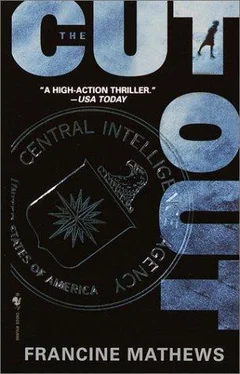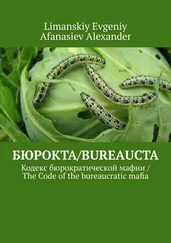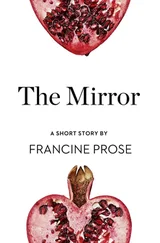She feels him watching even while she sits alone in Arlington, a hundred miles away — that silent surveillance like a stroke on her neck. The sense of him burns in her throat as warm as whiskey, and she thinks, He is watching me . Eric's love, Eric's too — intent and narrow-eyed passion, her breath catching thick at his touch.
“What are you thinking?” he asks her again.
“Have I given you that right, too? The inside of my head? You've never given it to me.”
She sounds deliberately amused. Her way of keeping the world at bay.
“That's important, isn't it? What I give and don't give.”
“Only when you want something in return,” she says.
“You try very hard. To love me without conditions. You think that's what I need.”
“Isn't it?”
“You're afraid of losing me. If you build me a cage.” His voice is remote.
She sits up, pulls her bare knees to her chest, the sticky wetness between her legs nothing more than a mess. She reaches for her clothes.
“All right,” she says.
“I'm thinking about loyalty. Whether it's possible to give without thought, without conditions. Blind loyalty.”
His hand closes on her wrist. She stops pulling up her jeans. Slides into the crevice between his side and his arm and lies there, her cheek against the marble skin.
“Blind loyalty is always possible. And it's always a mistake.”
She lets out a little sigh of despair.
“Where are your loyalties, Eric? I'm not talking about love or sex or even myself. I'm curious. About you. What claims your soul?”
A snort.
“You think I've got one?”
She turns away from him. Shoves her foot into a shoe.
He watches in silence. Another man would be smoking now, but Eric gave up cigarettes when he gave up the streets of Boston, gave up his foster family's name, gave up the idea of fairness. He is watching her trying not to notice him watching her.
“You can't do this job without some kind of loyalty,” he says.
“You can't be a marine, a Green Beret, or an Intelligence operative not unless you decide that something matters beyond yourself.”
“Your country?” She tugs a sweater over her head and mutters, “Bullshit. Country is an excuse for wanting to die.”
He thrusts her back into the grass with such unexpected force that she's winded for an instant. She lies there, Eric's weight on her chest, his eyes inches from her own, and stares into the blue.
“Okay. One loyalty drives me, one thing I won't betray. Call it a pact with myself, Caroline, if you're tired of country. A long time ago I said I'd never close my eyes on deliberate evil. That sounds pretty broad, and pretty simple. But it's my brand of integrity. Of keeping the faith. Of an inner standard I walk every day. I may hurt the people around me, I may fail them in ways they never expected but I will not do less than the best job I can with the work in life I've chosen.”
“Which is?”
“Making the world a safer place.”
She moves under him restlessly, an objection forming. He ignores her. “You think that sounds stupid. Or grandiose. Fine. I'm not like other people, Caroline, who dream of a perfect world and try to create it, even if it's just in their own backyards. I pace off the property and find out why it's for sale. I test the broken board in the fence where the fox creeps in, I poke spikes in the rat holes. I name every weed and mark where it grows. It's all I've got, Caroline — this permanent fixer-upper. You stop work for a day, and the place falls down around you.”
Caroline stares at herself now in the fourth-floor bathroom mirror. There are lines scrawled at the corners of her eyes, dark blotches under the skin. Her lips are thin and dry. She closes her eyes, waiting for a whiskey rush, for the sense of Eric watching her — but nothing comes across the miles that separate them, no sense of love or loyalty.
You stop work for a day, and the place falls down around you . Only she hadn't stopped. She'd been working for years, plugging holes and nailing up fences. And he'd never bothered to tell her he was alive.
Where were you going from Frankfurt, Eric? And why are you hiding in those weeds you marked so carefully?
What exactly am I supposed to believe?
Eight
Langley, 11:53 a.m.
Caroline's strongest impulse upon quitting the women's room was to leave the Old Headquarters Building. She could retrieve her car from the acres of asphalt that lapped the campus like a modern-day moat, and drive through the back roads of McLean the high banks of horse fields and elm. In a car, however, she would have no buffer from her raging thoughts. No work to consume her, no colleagues to force the daily pleasantries from her mouth. She turned back into the CTC and strode toward the ranks of gray metal shelves that rose at one end of the room.
She had researched the lives of the men — and they were all men — who made up 30 April. Their stories were presented almost clinically in the Agency's biographic profiles.
These one-page reports were intended for use as briefing aids for government officials. The bios were chatty and informative, riddled with small detail and the occasional sweeping judgment. Text was punctuated with Intelligence controls — U for Unclassified, C for Confidential, 5 for Secret. The most heated debates flared over the use of OR CON information — Originator-Controlled — which signaled that the source was a foreign national, an asset on the payroll of the Directorate of Operations. A secret agent, in the more romantic language of a vanished age.
Caroline pulled out a heavy green file and sat awkwardly on the carpet, high-heeled legs folded as discreetly as her slim skirt would all owe She would start with the apprentice in the group, the youngest of Mian Krucevic's recruits: thirty-year-old Antonio Fioretto .
Fioretto was a computer genius, twice incarcerated for fraud in Italy, where no one is imprisoned for fraud. The funds he'd illegally transferred out of a variety of Swiss bank accounts had never been recovered. He now served as 30 April's main accountant and electronics whiz. The photograph in his biographic profile had been taken from a police mug shot — grainy, unsmiling, curly-headed, and weak-jawed. The hair was blond; he was Milanese. What the photo failed to show was the healed scars of three suicide attempts. Antonio's wrists were hacked to shreds.
She slid his file back into the stack.
Otto Weber . Native of Zurich, recovered heroin addict, an obsessive bodybuilder and martial arts practitioner. He had grown up on the streets, quit school at thirteen, worked episodically as a male prostitute. Weber was rumored to be a confirmed sadist. The 30 April member who enjoyed killing.
Vadav Slivik . A retired captain in the former Czechoslovak Army, Slivik could fly anything with wings and served as 30 April's explosives and weapons expert. A mild-looking man, from his photograph; cynical eyes, a humorous mouth. In 1972, at the Munich Olympics, he had won a gold medal in the pentathlon. He allegedly played cello in his spare time, although public performances were rare of late.
Caroline pulled the fourth file and opened it with unsteady fingers. This one she would read in its entirety.
Mian Krucevic. Leader, 30 April Organization .
No picture for the bio she had written three years before, and updated every six months. Krucevic had never been captured on film.
Perhaps the most ruthless terrorist to emerge from the breakup of Yugoslavia, Mian Krucevic is thought to reside in Germany, although his present whereabouts are unknown. A trained geneticist with advanced degrees from two European universities, Krucevic served as director of a Croat prison camp in Bosnia-Herzegovina from 1990 to 1993. He is alleged to have approved the torture and murder of over three thousand Muslim and Serb civilians during his tenure at the prison camp, where he is believed to have used biological agents in human experimentation. He has been indicted by the International War Crimes Tribunal on nineteen counts of crimes against humanity and is currently a fugitive from justice. (C NF NC) In 1993, Krucevic announced the formation of the 30 April Organization, a neo-Nazi militarist group, with the simultaneous firebombing of seven Turkish guest-worker hostels throughout Germany; sixteen people died in the acts of arson. According to a reliable source with limited access, 30 April is also responsible for the death of Anneke Schmidt, Germany's former Green Party leader, and the kidnapping and murder of Dammar Hammecher, granddaughter of the German federal court judge Ernst Hammecher. The terrorist group is also suspected of orchestrating last year's assassination of Germany's popular Socialist chancellor, Gerhard Schroeder. (S NF NC OC) In the 30 April Organization, Krucevic has assembled and trained an elite group of mercenary fighters hailing from several European countries, who are united by their adherence to his ideology. Although Krucevic has allegedly professed anti-Semitic views, his deepest hatred is reserved for adherents to the faith of Islam, which he has declared is on the verge of destroying Christianity. An untested source with good access reports that Krucevic's ultimate goal is the ethnic cleansing of Central Europe. (S NF NC OC) According to a reliable source with limited access, Krucevic fled Bosnia-Herzegovina in 1993 and lived under a series of assumed names in Scandinavia and eastern Germany. He is reported to have set up a black-market network for the production and distribution of deadly biological agents.
Читать дальше







![Микки Спиллейн - Death of the Too-Cute Prostitute [= Man Alone]](/books/437201/mikki-spillejn-death-of-the-too-thumb.webp)




